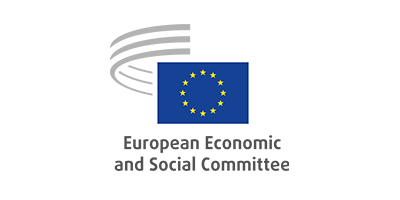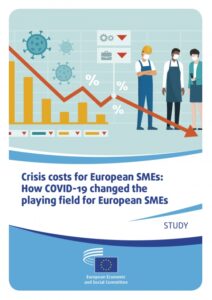STUDY
Crisis Costs for European SMEs
How COVID-19 changed the playing field for European SMEs

Period: November 2021 – October 2022
Funding institution: European Economic and Social Committee (EESC)
Link: Crisis costs for European SMEs: How COVID-19 changed the playing field for European SMEs
Final Report pdf: How COVID-19 changed the playing field for European SMEs
Amount: 60.000 Euro

Both the EU institutions and the international economy experts easily claim that Small and Medium Enterprises (SMEs) are at the heart of the European economy. However, the year 2020 and the advent of the COVID-19 pandemic soon became the landmark for one of the greatest economic recessions ever experienced to which SMEs have not been immune. Declines in sales and revenues, supply and service disruptions, increase in late payments and entire months operating at a financial loss often became the new norm for many EU small and medium businesses.
However, this was not perceived equally by all typologies of SMEs. The European Commission did not fail to identify that while certain sector-industries were severely affected (i.e., ‘accommodation and food service activities’, ‘transport and storage’, ‘manufacturing’) or moderately decreasing (e.g., home energy supply, construction or scientific and technical activities), other sectoral SMEs (particularly in the digital sector and information and communication industries) experienced either a very small decrease or even an increase in total added value and employment (EC Annual Report on SMEs, 2021). Notwithstanding, there is still a generally perceived lack of an exploratory framework capable of interpreting such differentiated performance and deliver possible explanatory patterns on the data.
This research thus aims at the development of a systematic classification of transformative impacts on SMEs brought by pandemic challenges at several levels. This will be exploited to later develop a targeted performance analysis for each of the 6 sectors and in the 12 countries-sample requested by the call. Finally, this will help to elaborate a list of strategic public policy proposals meant to assist decision-makers in the development of tailored strategies for future SMEs support and interventions.
The added value of this study is represented by both the will to develop a comprehensive framework of impacts on all enterprises which is currently spread across the scientific/institutional literature and its application on specific samples of SMEs belonging to the requested countries and sectors. The qualitative study (containing both theoretical approaches to global and sectoral SMEs) will also be accompanied by a qualitative enquiry to SMEs actors and by a preliminary mapping of quantitative data investigated through the availability of open access datasets and stakeholder associations at national and EU level.
Finally, the research team developing the study belongs to the following partnership:
Wise Angle: Study Leader
SHINE 2Europe role: Co-developer
International Network for Small and Medium Enterprises (INSME) role: Subcontractor (External Expert)

